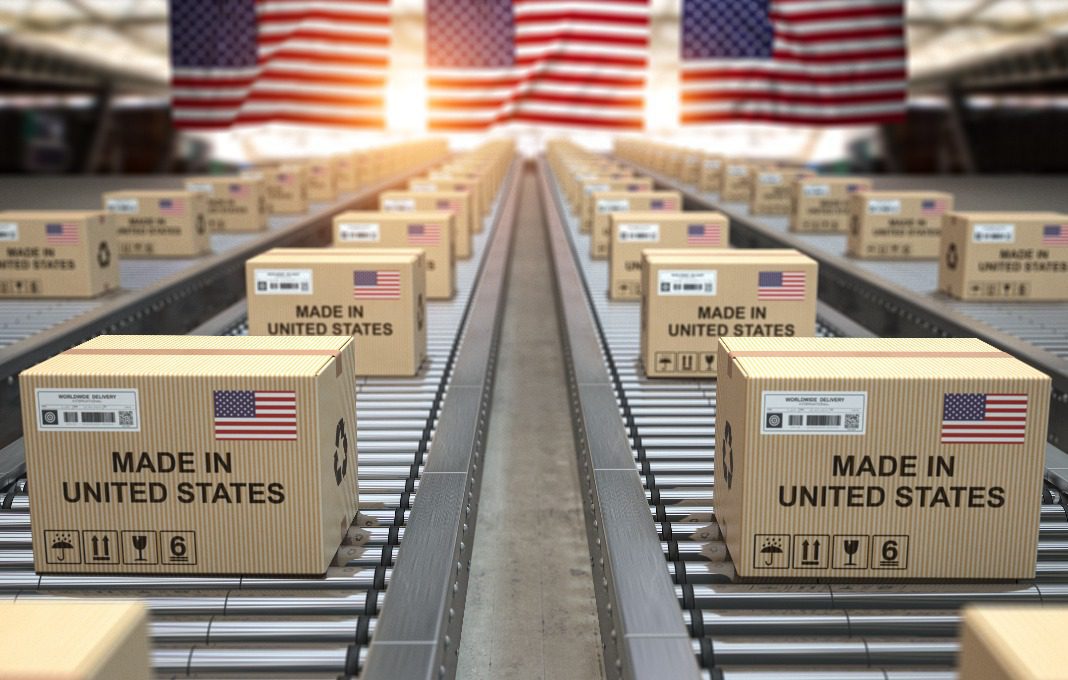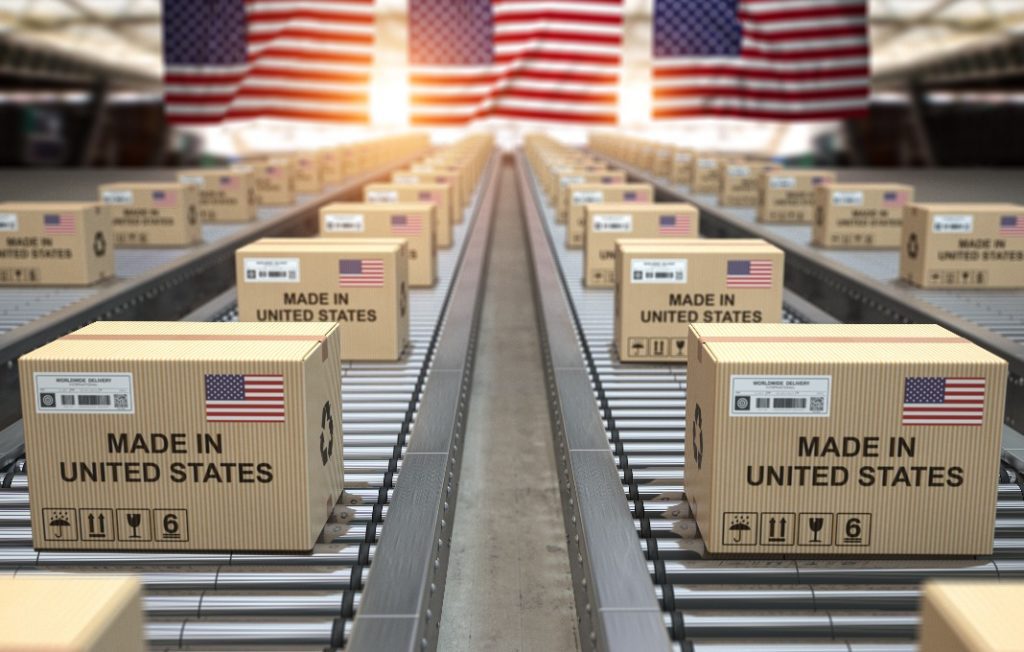Why The Path To Recovery Requires A Return To ‘Made In The USA’


 While our country continues to face exceptional challenges at the hands of the pandemic, extreme adversity is not unique to 2020. In recent years, the impacts of severe global weather events caused by the climate crisis, escalating trade wars and the polarizing political environment have made it plenty difficult for businesses to maintain their footing. This year’s Covid-19 pandemic and America’s overdue awakening on racial injustices have only accelerated the need to support our nation’s frontline industries, essential workforce and underserved communities.
While our country continues to face exceptional challenges at the hands of the pandemic, extreme adversity is not unique to 2020. In recent years, the impacts of severe global weather events caused by the climate crisis, escalating trade wars and the polarizing political environment have made it plenty difficult for businesses to maintain their footing. This year’s Covid-19 pandemic and America’s overdue awakening on racial injustices have only accelerated the need to support our nation’s frontline industries, essential workforce and underserved communities.
As we look at both societal and business concerns through a seemingly existential lens, one of the many necessary solutions is clear to me—we must return to a “Made in America” approach for essential manufacturing. And I’m not alone. It is encouraging to see the new administration lean into U.S.-based manufacturing, but political rhetoric isn’t enough. Here’s the roadmap to how the public and private sectors can make it happen.
Despite popular opinion, the future of manufacturing and its workforce will not resemble a scene from a Hollywood blockbuster movie. While increasingly investing in advanced technologies like automation, artificial intelligence (AI) and machine learning (ML) will help create smarter, more resilient manufacturing equipped to combat future disruptions, the supply chain will always require a human touch. As industry leaders, we must focus on bridging the skills gap to build a world-class workforce that can support the U.S.-based supply chain and be augmented by its technological advancements, not replaced.
The number of manufacturing jobs flatlined last year and fell sharply with the pandemic, adding to the more than five million American manufacturing jobs lost since 2000. However, by incorporating new technologies and retraining the workforce for the jobs of tomorrow, we can not only create more higher paying job opportunities, but equitably distribute these opportunities and revitalize our nation’s most underserved communities by placing operations closer to where they’re needed most. Creating opportunity is the first step, but adequately investing in the education and training needed to retain a talented workforce is the only way to truly strengthen U.S. supply chains.
Green—the most discussed color of the last decade and not without fair reason. As we bring manufacturing back to the U.S., the supply chain supporting it should be overhauled with sustainability best practices and “greener” than ever before, making it the modern model templatized by the rest of the world.
Though the sustainability challenge grows more complex every day, technology can help businesses operate both responsibly and profitably via reduced waste, more efficient production, smarter transportation strategies, reduced resource consumption and other stewardship practices. Companies using more advanced solutions, such as AI and ML, can ingest internal and external signals—social media, news, events, weather and IoT data—to sense disruptions, identify the impact and prescribe corrective action that takes social and environmental responsibility into consideration.
America’s overreliance on offshore manufacturing has most recently raised concerns as we witnessed China’s overwhelming influence on our access to essential pharmaceuticals and healthcare goods. While the pandemic has largely proven the need for more onshoring strategies to address future crises, businesses’ buy-in to return to U.S. soil will only be realized through incentivization.
While a split Congress could result in more gridlock than action in the coming years, both sides of the aisle must recognize the clear benefits of reshoring critical supply chains— especially for medical supplies, pharmaceuticals, PPE, food production and semiconductors. Balance will be key. The National Association of Manufacturers (NAM) is calling on leaders “to make smart policy decisions that incentivize job creation and investment in America, without closing off critical global supply chains.” Federal and state governments must act now, because our businesses stand ready to enact smart solutions with meaningful outcomes to support this movement.
By embracing advanced technologies, enhancing the workforce’s skillsets and investing in more sustainable business practices, we can bolster meaningful career opportunities for Americans, combat racial inequality, protect our planet and keep U.S. supply chains moving when faced with future roadblocks. While these are business decisions, they are also ethical ones. Regardless of your political party, one thing we can hopefully agree on is that smarter U.S. manufacturing will benefit us all.
Chief Executive Group exists to improve the performance of U.S. CEOs, senior executives and public-company directors, helping you grow your companies, build your communities and strengthen society. Learn more at chiefexecutivegroup.com.
0

1:00 - 5:00 pm
Over 70% of Executives Surveyed Agree: Many Strategic Planning Efforts Lack Systematic Approach Tips for Enhancing Your Strategic Planning Process
Executives expressed frustration with their current strategic planning process. Issues include:
Steve Rutan and Denise Harrison have put together an afternoon workshop that will provide the tools you need to address these concerns. They have worked with hundreds of executives to develop a systematic approach that will enable your team to make better decisions during strategic planning. Steve and Denise will walk you through exercises for prioritizing your lists and steps that will reset and reinvigorate your process. This will be a hands-on workshop that will enable you to think about your business as you use the tools that are being presented. If you are ready for a Strategic Planning tune-up, select this workshop in your registration form. The additional fee of $695 will be added to your total.

2:00 - 5:00 pm
Female leaders face the same issues all leaders do, but they often face additional challenges too. In this peer session, we will facilitate a discussion of best practices and how to overcome common barriers to help women leaders be more effective within and outside their organizations.
Limited space available.

10:30 - 5:00 pm
General’s Retreat at Hermitage Golf Course
Sponsored by UBS
General’s Retreat, built in 1986 with architect Gary Roger Baird, has been voted the “Best Golf Course in Nashville” and is a “must play” when visiting the Nashville, Tennessee area. With the beautiful setting along the Cumberland River, golfers of all capabilities will thoroughly enjoy the golf, scenery and hospitality.
The golf outing fee includes transportation to and from the hotel, greens/cart fees, use of practice facilities, and boxed lunch. The bus will leave the hotel at 10:30 am for a noon shotgun start and return to the hotel after the cocktail reception following the completion of the round.